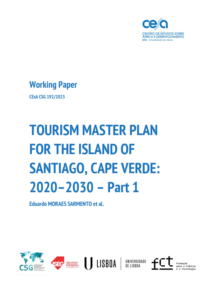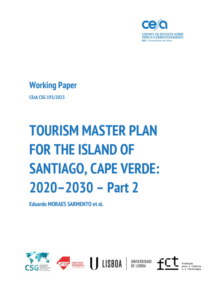CESA Working Papers No 192/2023 and 193/2023 propose a tourism plan for the island of Santiago, Cape Verde
CEsA published its fifth and sixth Working Papers for 2023: “Tourism Master Plan for the Island of Santiago, Cape Verde: 2020-2030 – Part 1” (No 192/2023) and “Tourism Master Plan for the Island of Santiago, Cape Verde: 2020-2030 – Part 2” (No 193/2023), in English, authored by Eduardo Moraes Sarmento, CEsA researcher and professor of the Master in Development and International Cooperation at the Lisbon School of Economics and Management (ISEG).
Click here to download Working Paper No. 192/2023: https://www.repository.utl.pt/handle/10400.5/27621
Click here to download Working Paper No. 193/2023: https://www.repository.utl.pt/handle/10400.5/27622
Read the abstracts below:
Working Paper 192/2023
 Cape Verde, a small insular development economy (SIDS), has been confronted and faces various economic, social and environmental constraints throughout its history that have been conditioning its growth strategy. In recent years, tourism has been growing and consolidating an important contribution to economic development, which is observable in the evolution of the number of nights spent in the country, revenue, number of guests, employment generation, and incentive to export among others. The gross added value of tourism currently has a weight that is already more than 20% of its GDP (excluding the COVID-19 pandemic period). Aware of this potential, the Government created conditions for a greater use of its effects as a mobilizing factor in the economy. Accordingly, various official supporting documents and strategic orientations have been approved, such as the Strategic Plan for Sustainable Development and the Main Options of the Strategic Plan for Sustainable Development for the Tourism Activity. It was also decided that each island or region should develop its own strategic tourism plan (Masterplan). This paper integrates the main strategic reflections regarding the Tourism Master Plan for the Island of Santiago. Revenue from tourism on the Island of Santiago, where the capital of Cape Verde is located, has been much less than the values of the main islands with a high volume of tourists – Sal and Boa Vista. However, the potential of Santiago is high, and therefore it is necessary to adopt the correct measures required to transform this potential into reality. Therefore, this paper presents a short, medium and long-term vision, with a proposal for strategic objectives that will constitute the anchor on which all operational strategic and objectives that will translate into specific lines of action will be based. In summary, this document proposes a strategy based on a diversified and differentiated touristic offer from the other islands of the country, which maximises its potential, counteracting regional asymmetries and preserving the historical and intangible heritage, as well as the natural resources, with the aim for the whole population to benefit from the resultant economic development, especially the most disadvantaged.
Cape Verde, a small insular development economy (SIDS), has been confronted and faces various economic, social and environmental constraints throughout its history that have been conditioning its growth strategy. In recent years, tourism has been growing and consolidating an important contribution to economic development, which is observable in the evolution of the number of nights spent in the country, revenue, number of guests, employment generation, and incentive to export among others. The gross added value of tourism currently has a weight that is already more than 20% of its GDP (excluding the COVID-19 pandemic period). Aware of this potential, the Government created conditions for a greater use of its effects as a mobilizing factor in the economy. Accordingly, various official supporting documents and strategic orientations have been approved, such as the Strategic Plan for Sustainable Development and the Main Options of the Strategic Plan for Sustainable Development for the Tourism Activity. It was also decided that each island or region should develop its own strategic tourism plan (Masterplan). This paper integrates the main strategic reflections regarding the Tourism Master Plan for the Island of Santiago. Revenue from tourism on the Island of Santiago, where the capital of Cape Verde is located, has been much less than the values of the main islands with a high volume of tourists – Sal and Boa Vista. However, the potential of Santiago is high, and therefore it is necessary to adopt the correct measures required to transform this potential into reality. Therefore, this paper presents a short, medium and long-term vision, with a proposal for strategic objectives that will constitute the anchor on which all operational strategic and objectives that will translate into specific lines of action will be based. In summary, this document proposes a strategy based on a diversified and differentiated touristic offer from the other islands of the country, which maximises its potential, counteracting regional asymmetries and preserving the historical and intangible heritage, as well as the natural resources, with the aim for the whole population to benefit from the resultant economic development, especially the most disadvantaged.
Working Paper 193/2023

Cape Verde, a small insular development economy (SIDS), has been confronted and faces various economic, social and environmental constraints throughout its history that have been conditioning its growth strategy. In recent years, tourism has been growing and consolidating an important contribution to economic development, which is observable in the evolution of the number of nights spent in the country, revenue, number of guests, employment generation, and incentive to exports, among others. The gross added value of tourism currently has a weight that is already more than 20% of its GDP (excluding the COVID-19 pandemic period). Aware of this potential, the government created conditions for a greater use of its effects as a mobilizing factor in the economy, as reflected in various official supporting documents and strategic orientations, such as the Strategic Plan for Sustainable Development, and the Main Options of the Strategic Plan for Sustainable Development for the Tourism Activity. The Government decided that each island or region should develop its own strategic tourism plan (Masterplan). This paper proposes several main strategic reflections about the Tourism Master Plan for the Island of Santiago in order to improve its competitiveness.
Get to know the previous editions published in 2023:
Working Paper 189/2023: Fragilities and shocks effects on households and communities in West Africa
Author: CEsA Communication (comunicacao@cesa.iseg.ulisboa.pt)
Image: CEsA/Reproduction





